|
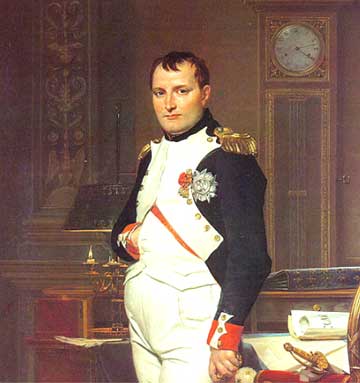
|
When most of us want
information about chess history, we look in books and periodicals, even
internet sites, devoted to that subject. Thanks to the great chess
historians from
H.J.R. Murray
to
Edward Winter,
much of this information has been collated for our collective benefit.
That's the basis of chess history, but it doesn't end there.
Modern researchers and
storytellers such as
Prof. Jerry Spinrad
are utilizing the unique capabilities of digitalized books and newspapers
to gather previously elusive perspectives on historic persons and events.
It's all good, but it doesn't end there.
People have always been
interested it literature, art and films about chess and there is a lot
written on those subjects. The indefatigable and amazing
Bill Wall
has developed lists and more lists showing us all about these connections.
But it doesn't end there.
There's a slightly skewed,
more indirect way of researching chess history that few people follow. I
subscribe to it and Lawrence Totaro, proprietor of
Ultimate Chess Collecting
and author of the book,
Fisching for Forgeries,
and who wrote the following article, does too. The premise if that chess
is more than a game - it's a culture all to itself. As such, those who
involve themselves in that culture and carry a part of it inside
themselves, often see things in chess terms others might not and express
themselves from that point of view. So, we have musicians, authors,
cinematographers, historians, sociologists, philosophers bringing chess
into subjects that aren't chess-specific. A corollary to this approach is
that the understanding of chess history is enriched by an understanding of
the events and customs of the time that have nothing directly to do with
chess itself. While this holistic approach isn't necessary, it's certainly
worthwhile and often far more interesting and entertaining.
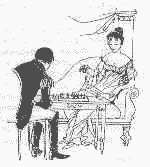 Below,
Mr. Totaro shares some references he found concerning Napoleon and chess.
It should be noted that there are four games attributed (all incorrectly)
to Napoleon Bonaparte. All four can be viewed at
chessgames.com.
Two of the games are with Empress Joséphine's Lady-in-waiting, Elisabeth
le Michaud d'Arcon de Vaudey,
Madame De Remusat
with whom Napoleon had an affair (actually one game is a mirror image of
the other); one game is with the Automaton, the Turk (Johann Allgaier) and
one is with
Henri Gratien, Comte Bertrand
when in exile at St. Helena. While undoubtedly Napoleon played each of
these individuals at chess, it's just as clear that these were not the
games. Below,
Mr. Totaro shares some references he found concerning Napoleon and chess.
It should be noted that there are four games attributed (all incorrectly)
to Napoleon Bonaparte. All four can be viewed at
chessgames.com.
Two of the games are with Empress Joséphine's Lady-in-waiting, Elisabeth
le Michaud d'Arcon de Vaudey,
Madame De Remusat
with whom Napoleon had an affair (actually one game is a mirror image of
the other); one game is with the Automaton, the Turk (Johann Allgaier) and
one is with
Henri Gratien, Comte Bertrand
when in exile at St. Helena. While undoubtedly Napoleon played each of
these individuals at chess, it's just as clear that these were not the
games.
[see
Edward Winter's excellent treatment].
Napoleon with Madame De Remusat
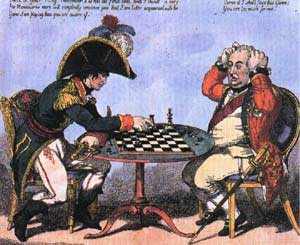
Napoleon: Check!
Remember that it is not first time; I believe that in a few more moves you
will be convinced that more I am better prepared for this game than you
thought!
Cornwallis: Curses! I
am going to lose this game; you are too much for me
1781
"Cornwallis' second-in-command, Charles O'Hara, attempted to deliver
Cornwallis's sword to French general, Comte de Rochambeau. But Rochambeau
directed O'Hara to American General George Washington, who coolly steered
the British officer to Washington's own second in command, Major General
Benjamin Lincoln."
According to Memoirs of
Napoleon Bonaparte, vol.16, by Louis A. F. Bourienne, his Private
Secretary; 1832:
[during his journey to exile
in St. Helena] He was but an, indifferent chess-player, and there was no
very good one on board. He asked, jestingly, "How it was that he
frequently beat those who beat better players than himself?" Vingt
et un was given up, as they played too high at it; and Napoleon had a
great aversion to gaming.
|
|
CHESS IN
NAPOLEON
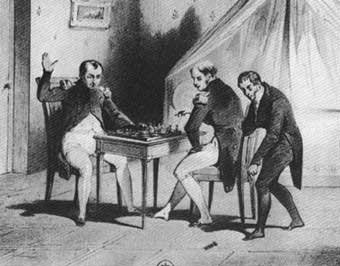
Napoleon at chess
It should be noted that we
must, as chess researchers, go beyond just chess references in order to
obtain objective knowledge. The following list of sources outside
the chess world illustrates the influence that chess has instilled on many
of its enthusiasts. Instead of searching for people, places and events
within “chess,” it is much more important as well as efficient, to
search for “chess” in other materials.
Memoirs Illustrating the
History of Napoleon I from 1802 to 1815. Volume: 1. Contributors:
Claude-François De Méneval - author, Napoleon Joseph De Méneval - editor.
Publisher: D. Appleton. Place of Publication: New York. Publication Year:
1894.
Page 58
Now they would snatch off his wig whilst he was sitting in grave
meditation in his arm-chair, now they would come and mix up the figures
on the chess-board just as he was absorbed over some difficult move.
Page 121
He lived in a very homely manner, especially when at La Malmaison. He
used to spend the hours which were not taken up by work, exercise, or
shooting, with Josephine. He used to lunch alone, and during this
repast, which was a relaxation for him, he received the persons with
whom he liked to converse on science, art, and literature. He dined with
his family, and after dinner would look in at his cabinet, and then,
unless kept there by some work, would return to the drawing-room and
play chess As a general rule he liked to talk in a familiar way. He was
fond of discussions, but did not impose his opinions, and made no
pretention of superiority, either of intelligence or of rank.
Napoleon at St. Helena:
Or, Interesting Anecdotes and Remarkable Conversations of the Emperor
during the Five and a Half Years of His Captivity. Contributors:
John S. C. Abbott - author. Publisher: Harper & Brothers. Place of
Publication: New York. Publication Year: 1855.
Pages 17-18
The voyage occupied sixty-seven days. The Emperor, as was his custom,
adopted regular habits for the employment of his time. He breakfasted in
his room, and passed the day, until five o'clock in the afternoon, in
reading writing, or conversing with those of his companions whom he had
invited to his cabin. He then dressed for dinner, and entered the
saloon, where he frequently amused himself for half an hour with a game
of chess.
Page 58 sh K.
Small parlor, with a little table upon which the Emperor often played
chess before sitting down to dinner.
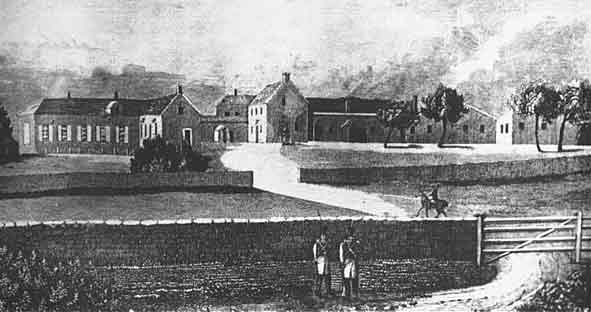
The Longwood House in St. Helena where Napoleon lived in
exile from 1816 until his death on 5 May 5, 1821
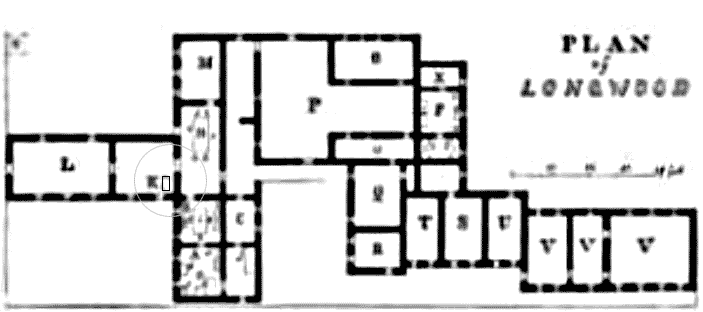
[the above picture of the floor
plan of Longwood has been edited to indicate the location of Napoleon's
chess board in room "K"]
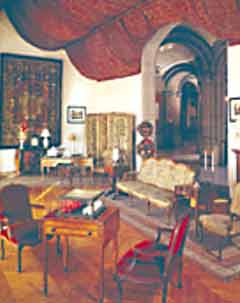
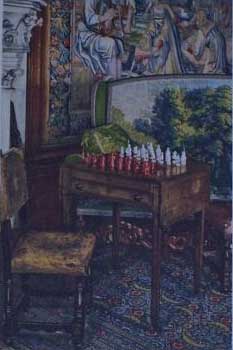
The
Salon in the Biltmore House
a postcard from the Biltmore House
that now houses Napoleon's Chess set
showing Napoleon's Chess set
The Salon. When the
men retired to the Billiard Room, or the Smoking Room or Gun Room in the
Bachelors' Hall, the women would often go to the Salon. Here, they would
read, engage in conversation, or play games-cribbage, checkers,
mah-jongg, card games like whist and euchre, or perhaps chess on an
Empire walnut game table with ivory pieces used by Napoleon while exiled
on St. Helena Island (1815-1821). They could consider the wonderful
hangings created for Cardinal Richelieu, the 17th century French
statesman. The hangings are velvet and stitched with metal-thread
couching depicting the cardinal's hat and armorial bearings.
Page 103
A short time before dinner, I presented myself as usual in the
drawingroom. The Emperor was playing at chess with the grand marshal.
The valet de chambre in waiting at the door of the room brought me a
letter, on which was written very urgent. Out of respect to the Emperor,
I went aside to read it. It was in English. It stated that I had written
an excellent work; that, nevertheless, it was not without faults; that
if I would correct them in a new edition, no doubt the work would be
more valuable for it; and then went on to pray that God would keep me in
his gracious and holy protection.
Page 578
July 9. On the evening before the battle of Waterloo, an English
officer, Captain Elphinstone, had been grievously wounded, and was lying
stretched on the field in a hopeless condition. The Emperor happened to
pass near him, observed his situation, and sent the surgeon in
attendance on his person to make the necessary applications to stanch
his wounds, from which the blood was copiously flowing. His natural
goodness toward the wounded prompted him also to give him some wine from
the silver flask which one of the chasseurs of the Guard always carried
on service near his person. This providential assistance saved Captain
Elphinstone's life.
From the chess reference,
Le Palamède, 1838, we have something different. It does not mention,
however, that the set was made for saving Captain Elphinstone’s life, as
follows:
During his captivity at
St Helena Napoleon received from the Governor of the Indies, Sir John
Elphinstone, a superb chessboard made by the best Chinese workmen.
Napoleon had been generous to an English officer named Elphinstone and
when the captain’s brother, Sir John Elphinstone, learned that
Napoleon’s sole pastime at St Helena was chess he had the set made.
The letter N, surmounted by the Imperial Crown, was engraved on each
piece. It was decided by Hudson Lowe that the chess set would be given
to Napoleon only if he agreed to have the N and the imperial crown
effaced. On learning this, Napoleon shrugged his shoulders and said to
Marshal Bertrand: ‘Is the despatch of this chessboard an affair of
state? Does this man fear that I shall give check to all the kings of
Europe? Poor man.’ Napoleon was more impressed by the generous gesture
than by the cumbersome chess set itself. The rook sat on an enormous
elephant, and Napoleon said jokingly, ‘I should need a crane to move
this rook. I shall send the basket to Marie-Louise, the box of counters
to my mother and the chess pieces to my son’
Napoleon at St. Helena:
Or, Interesting Anecdotes and Remarkable Conversations of the Emperor
during the Five and a Half Years of His Captivity continues:
The Emperor was at that
time struggling with all Europe against him. His physical and mental
energies were oppressed by cares and toils, such as no mortal ever
sustained before. The night was darkening around him, and he was
pressing on to the fatal field of Waterloo. His personal attention to
the wounded Englishman, under these circumstances, is indeed an
extraordinary proof of his humanity. The Hon. John Elphinstone, brother
of the wounded officer, president of the East India Company's
establishment in China, in gratitude to the Emperor for thus saving the
life of a beloved brother, sent to St. Helena several small cases,
containing a set of chess-men in ivory, of marvelously beautiful
workmanship, a box of dice, another of counters, and two magnificent
baskets of large dimensions, all exquisitely carved. Each of these
objects was ornamented with the imperial crown, eagles, and letter N.
Page 124
"Had the king," Napoleon continued, "remained longer in France, he would
probably have lost his life in some insurrection. But had he fallen into
my hands, I should have thought myself strong enough to have allowed him
every enjoyment in some retreat of his own selection, as Ferdinand was
treated at Valençay."
Immediately after this conversation, the Emperor engaged in a game of
chess with Las Casas. His king having accidentally fallen from the
board, he exclaimed, "Ah! my poor king, you are down!" Las Casas picked
the piece up, and restored it to him in a mutilated state. "Horrid!"
said the Emperor; "I certainly do not accept the omen, and I am far from
wishing any such thing. My enmity does not extend so far."
Page 527
New-Year's Gifts--Representations of Chateaubriand and of Sir Robert
Wilson--Annoyance from Rats--Secret Amours of Napoleon--The Invasion of
England--Conduct of the Governor.
January 1. Dr. O'Meara was admitted to the Emperor in the drawingroom,
and wished him a happy New-year. Napoleon smiled and said, "I
hope that the succeeding year will find me better situated. Perhaps I
shall be dead, which will be much better. Worse than this can not be."
He then, with his own hand, presented to Dr. O'Meara a snuff-box,
saying, "Here, doctor, is a present I make to you, for the
attention which you have manifested toward me during my illness."
He also presented to the Countesses Bertrand and Montholon some
beautiful vases of porcelain, which had been presented to him by the
city of Paris. To Count Bertrand he gave a set of chess-men; to
Montholon and Gourgaud, handsome ornaments. Each one of the children
also received some elegant gift from him. It was a dark and dismal day,
and the island was enveloped in fog which the eye in vain attempted to
penetrate.
Page 579
The exiled, captive Emperor could take but little pleasure in receiving
gifts which had thus been soiled by the touch of the governor. But in
his dreary chamber he endeavored to forget these outrages. In the
evening he gathered his companions around him, and they passed a
cheerful hour in examining and admiring the exquisite workmanship of the
articles. "I will send," said he, "the work-basket to the Empress Maria
Louisa, the box of counters to my mother, and the chess-men and superb
board to my son."
In reference to these gifts, Mrs. Abell records the following pleasing
incident:
"Early one morning,
while I was wandering about the gardens and plantations at Longwood, I
encountered the Emperor, who stopped, told me to come with him, and he
would show me some pretty toys. Such an invitation was not to be
resisted, and I accordingly accompanied him to his billiard-room,
where he displayed a most gorgeously-carved set of chess-men, which
had been presented to him by Mr. Elphinstone. He might well call them
toys, every one being in itself a gem. The castles, surmounting
superbly chased elephants, were filled with warriors in the act of
discharging arrows from their bended bows; the knights were cased in
armor, with their visors up, and mounted on beautifully caparisoned
horses; mitred bishops appeared in their flowing robes; and every pawn
was varied in character and splendor of costume, each figure
furnishing a specimen of the dress of some different nation.
"Such workmanship had
never before left China: art and taste had been exerted to the utmost
to devise such rare specimens of skill and elegance. The Emperor was
as much pleased with his present as I should have been with a new
plaything. He told me he had just finished a game of chess with Lady
Malcolm with these beautiful things, and that she had beaten him--he
thought, solely from his attention having been occupied in admiring
the men instead of considering the game. The work-boxes and
card-counters were lovely, the latter representing all the varied
trades of China minutely executed in carving.
"Napoleon observed
that he thought the chess-men too pretty for St. Helena, and that
therefore he should transmit them to the King of Rome. Another present
which attracted my attention was a superb ivory tea-chest, which, when
open, presented a perfect model of the city of Canton, most
ingeniously manufactured of stained ivory; underneath this tray were
packets of the finest tea, done up in fantastic shapes."
Page 592
In this long communication the governor says, "Presents may be as
obnoxious to the security of detention as a letter, and might require to
be examined with a minuteness that would baffle any purpose of ornament
or utility to be derived from them. A letter may be concealed under the
squares of a chess-board, or the folds of a book cover, as well as in
the lining of a waistcoat; and I am not necessarily called to place my
trust in any person by whom they are sent.
Napoleon the First: A
Biography. Contributors: Arthur Dart Bissell - transltr, Edward
Gaylord Bourne - editor, Margaret Bacon Corwin - transltr, August Fournier
- author. Publisher: Henry Holt. Place of Publication: New York.
Publication Year: 1903.
Page 632
In this serious situation at the close of September, while "his game of
chess was growing puzzling," as the Emperor said to Marmont, he made
another effort at diplomacy.
Page 731
He divided his time between working on his memoirs, often dictating for
hours without weariness to Las Cases, Gourgaud, or Montholon; billiards,
chess, reading the English papers, which he had just learned to read for
himself, and new books that were sent him.
Napoleon, the Last Phase.
Contributors: Lord Rosebery - author. Publisher: Arthur L. Humphreys.
Place of Publication: London. Publication Year: 1900.
Page 157
He played at some games--billiards, in a careless fashion; reversi,
which he had been used to play as a child; and chess. At chess he was
eminently unskillful, and it taxed all the courtliness of his suite to
avoid defeating him; a simple trickery which he sometimes perceived. On
the Northumberland he had played ving et-un [the same as
Blackjack or twenty-one -sbc], but prohibited it when he found that
it produced gambling. At all games he liked to cheat, flagrantly and
undisguisedly, as a joke; but refused, of course, to take the money thus
won, saying, with a laugh, "What simpletons you are. It is thus that
young fellows of good family are ruined."
Napoleon.
Contributors: Herbert Fisher - author. Publisher: Henry Holt and Company.
Place of Publication: New York. Publication Year: 1913
Page 124
The conception of a monarch as a being whose principal function is to
please his subjects was quite alien to Napoleon. His duty and absorbing
pleasure was to rule them, and to rule them always. If he played cards
or chess, he played for victory; if he could not win by fair means, he
cheated.
Any other references
regarding “chess” within the world of Napoleon, readers are asked to
kindly pass them along.
|
|

